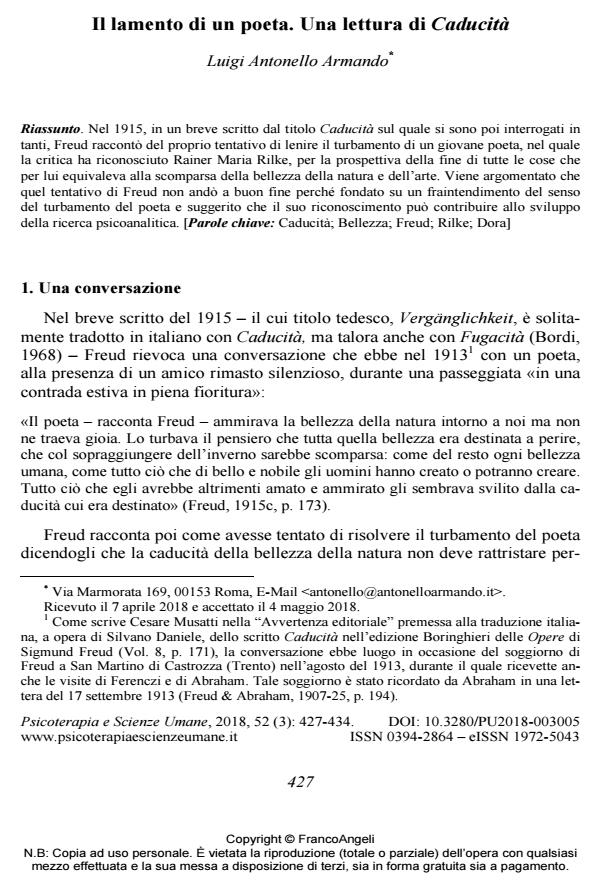The lament of a poet. A reading of Freud’s On transience
Journal title PSICOTERAPIA E SCIENZE UMANE
Author/s Luigi Antonello Armando
Publishing Year 2018 Issue 2018/3
Language Italian Pages 8 P. 427-434 File size 142 KB
DOI 10.3280/PU2018-003005
DOI is like a bar code for intellectual property: to have more infomation
click here
Below, you can see the article first page
If you want to buy this article in PDF format, you can do it, following the instructions to buy download credits

FrancoAngeli is member of Publishers International Linking Association, Inc (PILA), a not-for-profit association which run the CrossRef service enabling links to and from online scholarly content.
In 1916 Freud published an essay he wrote in 1915 (On transience), in which he reported his attempt to alleviate the anxiety of a young poet, commonly recognized as Reiner Maria Rilke, for his feared impending "end of all things", that is for the disappearance of all the beauty of nature and art. It is argued that Freud’s attempt failed because it was founded on a misunderstanding of the meaning of this poet’s anxiety, and suggested that its recognition can be of advantage to psychoanalytic research.
Keywords: Transience; Beauty; Sigmund Freud; Reiner Maria Rilke; Dora
- Antonelli G. (2014). Il mare di Ferenczi. La storia, il pensiero, la tecnica di un maestro della psicoanalisi (2 volumi). Roma: Alpes.
- Armando L.A. & Bolko M. (2017). Il trauma dimenticato. L’interpretazione dei sogni nelle psicoterapie: storia, teoria, tecnica. Milano: FrancoAngeli.
- Benvenuto S. (2014). Freud, the aim and the end / Freud, il fine e la fine. European Journal of Psychoanalysis, 1: -- www.journal-psychoanalysis.eu/freud-the-aim-and-the-end.
- Bordi S. (1968). Fugacità. Una nota sul processo creativo. Psiche, 1/2/3/4: 83-93.
- Fachinelli E. (1989a). La mente estatica. Milano: Adelphi.
- Fachinelli E. (1989b). Freud, Rilke e la caducità. In: Su Freud. Milano: Adelphi, 2012, pp. 83-92.
- Freud S. (1887-1904). The Complete Letters of Sigmund Freud to Wilhelm Fliess, 1887-1904 (Masson J.M., editor). Cambridge: Belknap Press of Harvard University Press, 1985 (trad. it.: Lettere a Wilhelm Fliess, 1887-1904. Torino: Bollati Boringhieri, 1986).
- Freud S. (1901 [1905]). Frammento di un’analisi di isteria (Caso clinico di Dora). Opere, 4: 301-402. Torino: Boringhieri, 1970.
- Freud S. (1915a). Lutto e melanconia. In: Opere, 8: 102-118. Torino: Boringhieri, 1976.
- Freud S. (1915b). Considerazioni attuali sulla guerra e sulla morte. Opere, 8: 123-148. Torino: Boringhieri, 1976.
- Freud S. (1915c [1916]). Caducità. Opere 8: 173-197. Torino: Boringhieri, 1976.
- Freud S. (1919). Il perturbante. Opere, 9: 81-114. Torino: Boringhieri, 1977.
- Freud S. (1929 [1930]). Il disagio della civiltà. Opere, 10: 555-630. Torino: Boringhieri, 1978.
- Freud S. & Abraham K. (1907-25). The Complete Correspondence of Sigmund Freud and Karl Abraham, 1907-1925. London: Karnac, 2002.
- Jones E. (1953). The Life and Work of Sigmund Freud. Vol. I. New York: Basic Books (trad. it.: Vita e opere di Freud. Milano: Il Saggiatore, 1962).
- Lehmann H. (1966). A conversation between Freud and Rilke. Psychoanalytic Quarterly, XXXV, 3: 423- 427.
- Magherini G. (1989). La sindrome di Stendhal. Firenze: Ponte alle Grazie.
- Novelletto A. (1969). Freud e l’Italia. Psiche. Bollettino dell’Istituto di Psicoanalisi di Roma, 7: 3-31. Ristampa: Rivista di Psicoanalisi, 2010, 56, 3: 693-717.
- Rella F. (1991). Il silenzio e le parole. Il pensiero nel tempo della crisi. Milano: Feltrinelli.
- Rilke R.M. (1898). Notizen zur Melodie der Dinge. In: Sämtliche Werke. Frankfurt a.M.: Insel, 1965 (trad. it.: Appunti sulla melodia delle cose. Firenze: Passigli, 2006).
- Rilke R.M. (1923). Duineser Elegien. Leipzig: Insel (trad. it.: Elegie Duinesi. Firenze: Parenti, 1937; Torino: Einaudi, 1978; Milano: Crocetti, 1999).
- Unwerth von M. (2005). Freud’s Requiem. Mourning, Memory, and the Invisible History of a Summer Walk. New York: Riverhead Books.
Luigi Antonello Armando, Il lamento di un poeta. Una lettura di Caducità in "PSICOTERAPIA E SCIENZE UMANE" 3/2018, pp 427-434, DOI: 10.3280/PU2018-003005